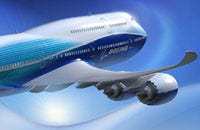The Boeing 747-8 features resin-transfer molded articulated cove panels.
July 15, 2009
|
Aircraft builder Boeing is relying for the new generation of 747-8 cargo and passenger jets on composite articulated cove panels from Ried, Austria-based processor FACC. The articulated cove panel is an aerodynamic wing panel that covers the area between the wing surface and landing flaps on the upper surface of the wing adjacent to the fuselage. During flight and particularly when deploying the landing flaps, this component is exposed to multiple forces that make the high load capacity of the component necessary. The first wing components for the jets were delivered on schedule in March. These complex, weight-saving panels are produced via resin-transfer molding technology, then baked under pressure in an autoclave to form the pieces. The new long-range plane is based on Boeing’s 747-400 model but with a fuselage that is 6m longer, wings that are claimed to offer better aerodynamics, and features the jet engine efficiency of the company’s Boeing 787. Boeing required that the plane’s vendors come up with parts that offer higher static stress but at a weight identical to the current 747-400 model. —[email protected]
About the Author(s)
You May Also Like



